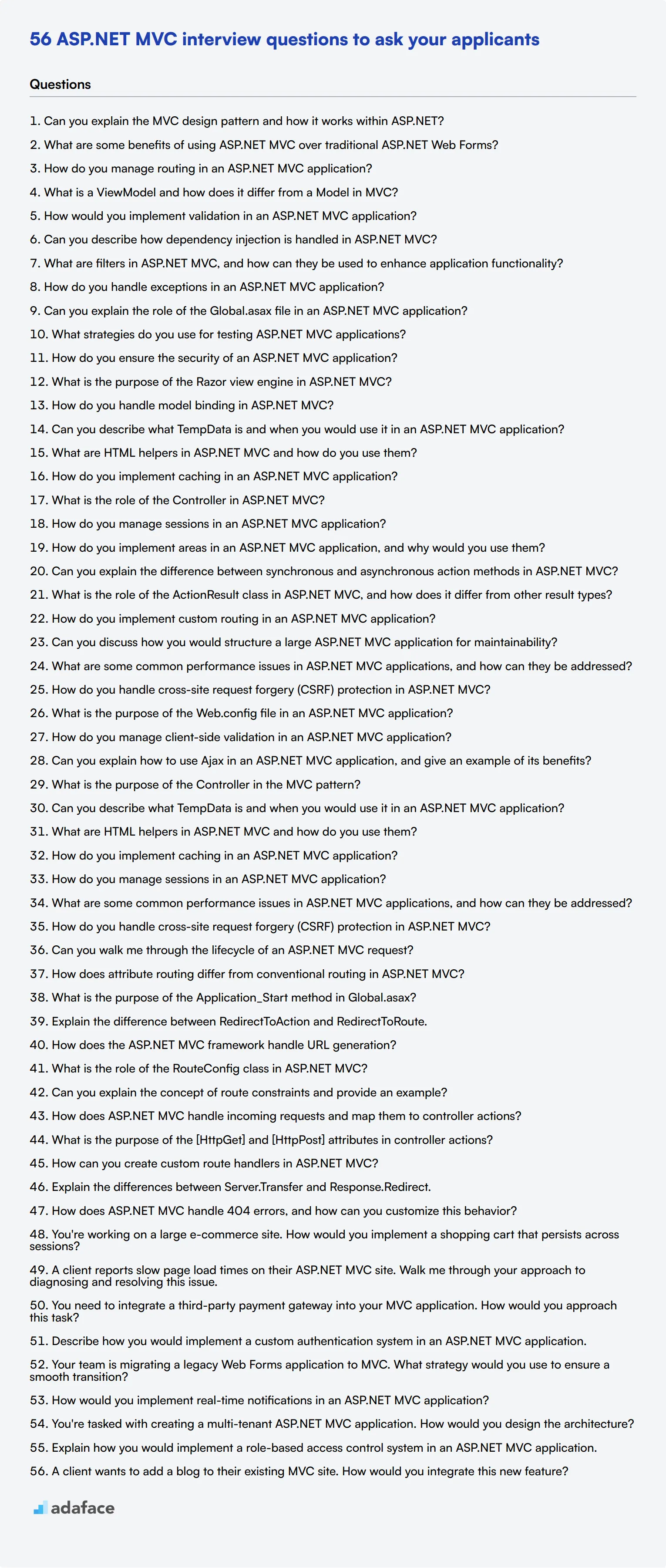Hiring the right ASP.NET MVC developer can make or break your project's success. Asking the right interview questions is key to identifying candidates with the necessary technical skills and problem-solving abilities.
This blog post provides a comprehensive list of ASP.NET MVC interview questions tailored for different experience levels. From junior to senior developers, we cover common, intermediate, and advanced topics to help you evaluate candidates effectively.
By using these questions, you'll be able to assess candidates' knowledge and find the perfect fit for your team. Consider complementing your interviews with a pre-screening assessment to streamline your hiring process and ensure you're interviewing the most qualified candidates.
Table of contents
10 common ASP.NET MVC interview questions to ask your candidates
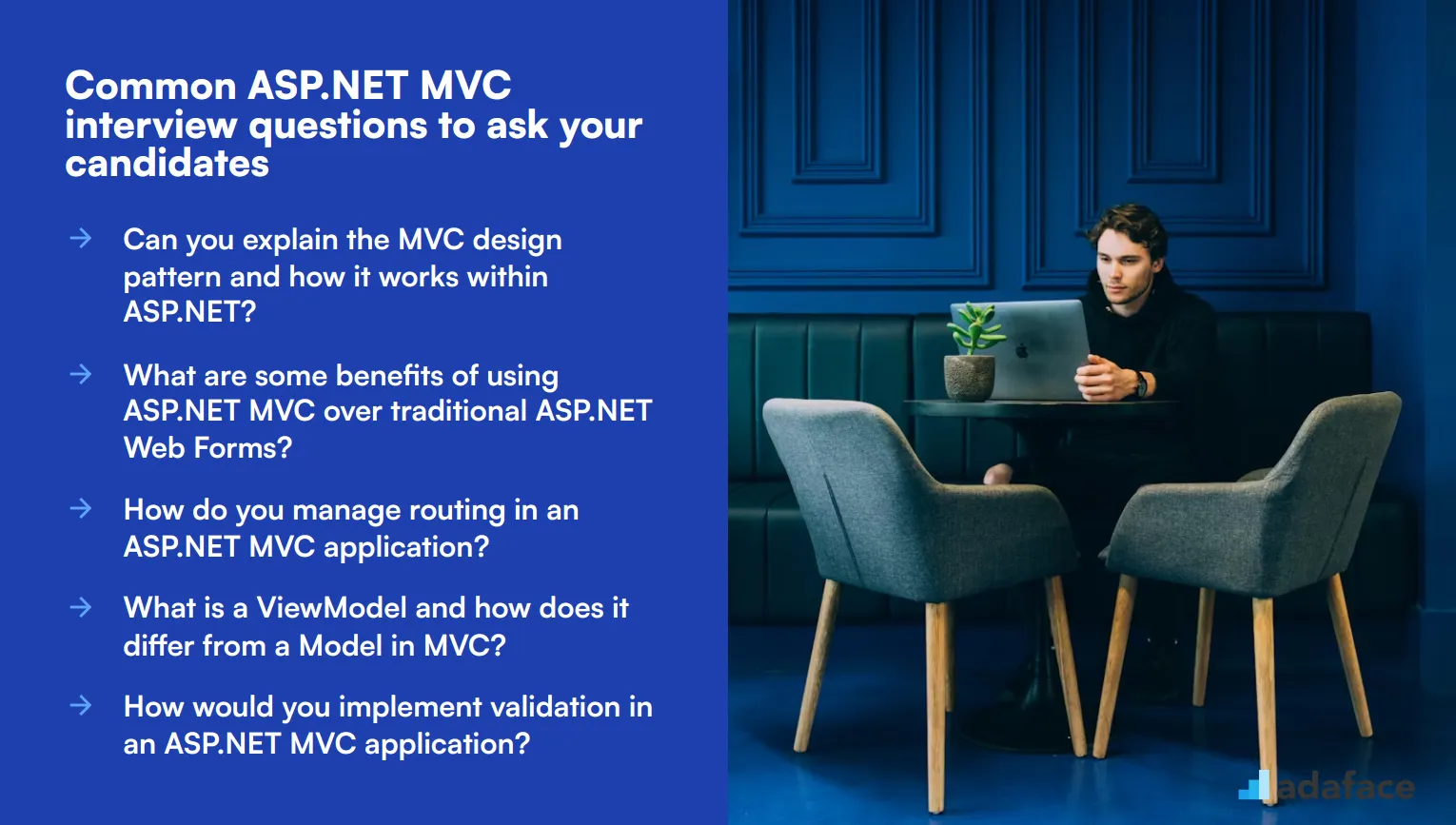
To effectively evaluate candidates for ASP.NET MVC roles, use these targeted interview questions. They will help you assess both the candidate's technical knowledge and their practical application of skills in real-world scenarios. For a more comprehensive understanding of the role, consider referring to the ASP.NET developer job description.
- Can you explain the MVC design pattern and how it works within ASP.NET?
- What are some benefits of using ASP.NET MVC over traditional ASP.NET Web Forms?
- How do you manage routing in an ASP.NET MVC application?
- What is a ViewModel and how does it differ from a Model in MVC?
- How would you implement validation in an ASP.NET MVC application?
- Can you describe how dependency injection is handled in ASP.NET MVC?
- What are filters in ASP.NET MVC, and how can they be used to enhance application functionality?
- How do you handle exceptions in an ASP.NET MVC application?
- Can you explain the role of the Global.asax file in an ASP.NET MVC application?
- What strategies do you use for testing ASP.NET MVC applications?
8 ASP.NET MVC interview questions and answers to evaluate junior developers
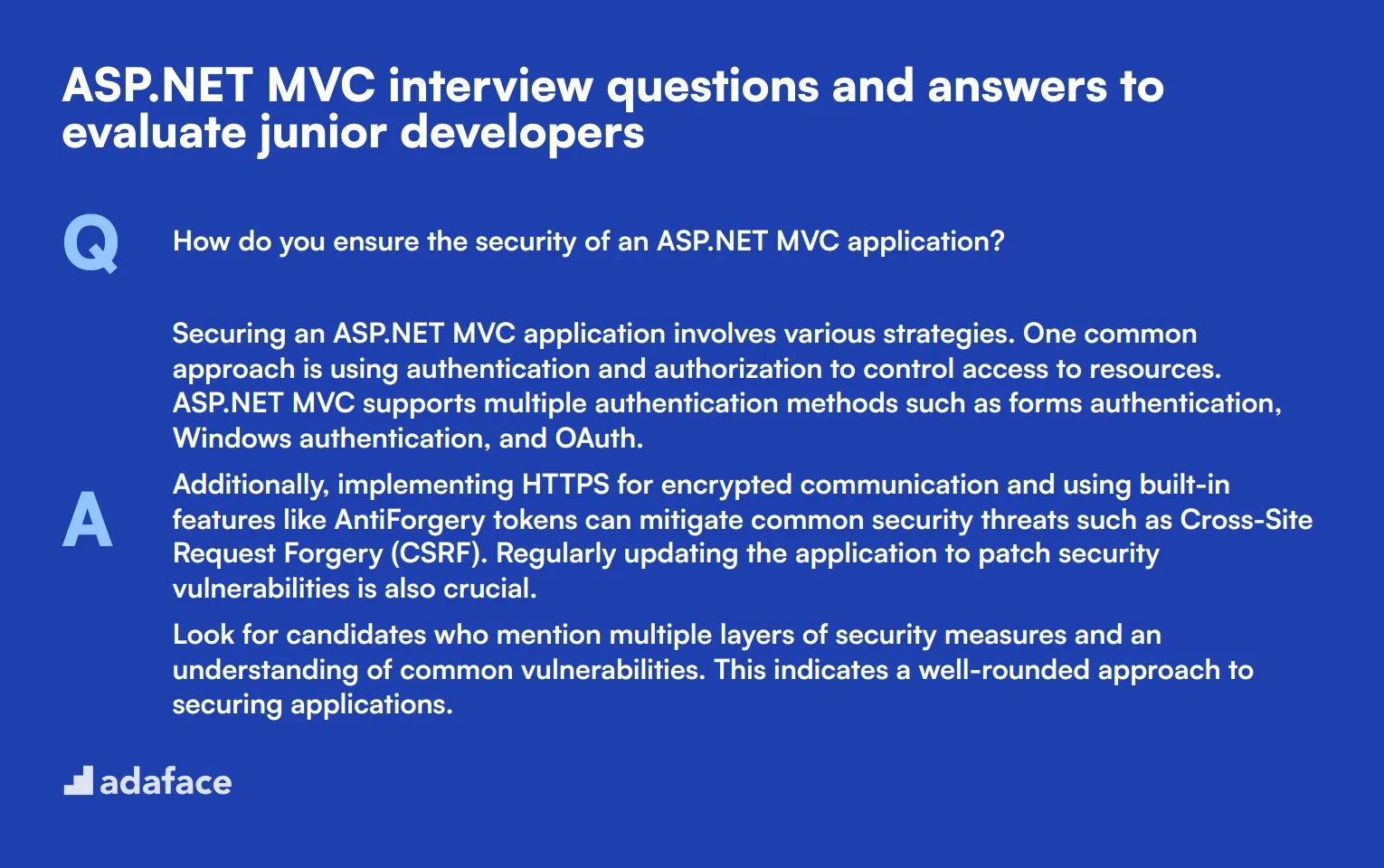
To gauge the capability and understanding of junior developers in ASP.NET MVC, here’s a handy list of interview questions. These questions will help you assess their grasp on key concepts and practices crucial for the role.
1. How do you ensure the security of an ASP.NET MVC application?
Securing an ASP.NET MVC application involves various strategies. One common approach is using authentication and authorization to control access to resources. ASP.NET MVC supports multiple authentication methods such as forms authentication, Windows authentication, and OAuth.
Additionally, implementing HTTPS for encrypted communication and using built-in features like AntiForgery tokens can mitigate common security threats such as Cross-Site Request Forgery (CSRF). Regularly updating the application to patch security vulnerabilities is also crucial.
Look for candidates who mention multiple layers of security measures and an understanding of common vulnerabilities. This indicates a well-rounded approach to securing applications.
2. What is the purpose of the Razor view engine in ASP.NET MVC?
The Razor view engine in ASP.NET MVC is designed to create dynamic web pages with clean and concise syntax. It allows developers to embed server-side code directly into HTML using the @ symbol, making it easier to write and maintain views.
Razor's syntax is compact and expressive, which helps reduce the amount of code needed compared to traditional ASPX view engine. It also provides features like HTML encoding by default to prevent Cross-Site Scripting (XSS) attacks.
Candidates should demonstrate an understanding of Razor's benefits in terms of both security and productivity. A thorough explanation of its syntax and advantages will indicate a strong grasp of the topic.
3. How do you handle model binding in ASP.NET MVC?
Model binding in ASP.NET MVC is the process of creating .NET objects using the data sent by the client in the HTTP request. The framework automatically maps form fields to model properties using conventions and attributes.
To customize model binding, developers can create custom model binders or use attributes like Bind and FromBody. This flexibility allows for handling complex scenarios such as binding multiple models or handling nested objects.
Look for a candidate who can explain both the default model binding process and ways to customize it. This shows a deeper understanding of how to manage data efficiently in various scenarios.
4. Can you describe what TempData is and when you would use it in an ASP.NET MVC application?
TempData is a storage mechanism in ASP.NET MVC that allows you to temporarily store data that needs to be available for the next request. It is often used to pass data between actions, especially when performing redirects.
The data stored in TempData is only available for a single request and is automatically cleared after it is read. This makes it ideal for scenarios like displaying success or error messages after a form submission.
Candidates should demonstrate an understanding of when and why to use TempData, distinguishing it from other state management options like ViewBag and Session. This indicates a practical approach to managing state in web applications.
5. What are HTML helpers in ASP.NET MVC and how do you use them?
HTML helpers in ASP.NET MVC are methods that generate HTML markup. They are used to simplify the process of creating and rendering HTML elements in views. Common HTML helpers include Html.TextBoxFor, Html.DropDownList, and Html.ActionLink.
These helpers ensure that the HTML output is properly formatted and can also handle tasks like setting attributes and binding to model properties. Custom HTML helpers can also be created to encapsulate complex HTML structures.
Look for candidates who can explain the benefits of using HTML helpers, including code reusability and maintainability. An understanding of built-in and custom helpers indicates proficiency in view development.
6. How do you implement caching in an ASP.NET MVC application?
Caching in ASP.NET MVC can be implemented using various techniques to improve application performance. One common method is using output caching, which stores the output of a controller action for a specified duration, thereby reducing the need to execute the action multiple times.
Data caching, on the other hand, involves storing frequently accessed data in memory using mechanisms like MemoryCache. This helps reduce database load and improves response times.
Candidates should explain the different types of caching and scenarios where each is appropriate. Look for an understanding of how caching impacts application performance and resource usage.
7. What is the role of the Controller in ASP.NET MVC?
In ASP.NET MVC, the Controller is responsible for handling user input and interactions. It processes incoming HTTP requests, works with the model to perform actions, and returns appropriate responses, typically in the form of views or JSON data.
Controllers contain action methods that correspond to user actions. Each action method can invoke business logic, manipulate data, and select views to render to the user.
An ideal candidate should demonstrate an understanding of the Controller's pivotal role in the MVC pattern, including how it interacts with models and views to create a cohesive application.
8. How do you manage sessions in an ASP.NET MVC application?
Session management in ASP.NET MVC involves storing user-specific data for the duration of the user's session. The session state can be stored in various ways, such as InProc (in memory on the web server), StateServer (out-of-process), or SQL Server (in a database).
Developers can use the HttpContext.Session object to store and retrieve session data. Session data is useful for maintaining user state, such as login information or shopping cart contents, across multiple requests.
Look for an understanding of different session storage options and their trade-offs, as well as practical knowledge of how to securely manage session data to enhance user experience.
10 intermediate ASP.NET MVC interview questions and answers to ask mid-tier developers.
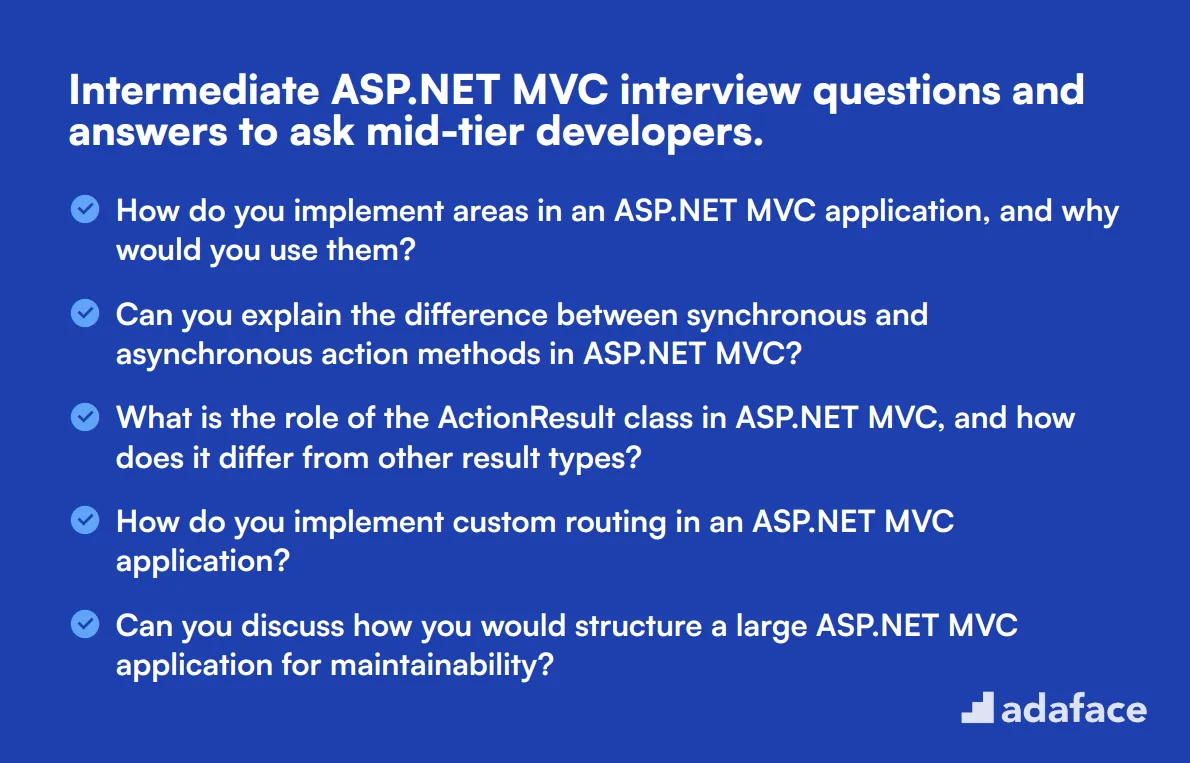
To assess the technical skills of mid-tier ASP.NET MVC developers, consider using this curated list of interview questions. These inquiries focus on real-world scenarios and technical understanding, helping you identify candidates who can effectively contribute to your team's success. For more details on what to look for in an application developer, check out our job description.
- How do you implement areas in an ASP.NET MVC application, and why would you use them?
- Can you explain the difference between synchronous and asynchronous action methods in ASP.NET MVC?
- What is the role of the ActionResult class in ASP.NET MVC, and how does it differ from other result types?
- How do you implement custom routing in an ASP.NET MVC application?
- Can you discuss how you would structure a large ASP.NET MVC application for maintainability?
- What are some common performance issues in ASP.NET MVC applications, and how can they be addressed?
- How do you handle cross-site request forgery (CSRF) protection in ASP.NET MVC?
- What is the purpose of the Web.config file in an ASP.NET MVC application?
- How do you manage client-side validation in an ASP.NET MVC application?
- Can you explain how to use Ajax in an ASP.NET MVC application, and give an example of its benefits?
7 ASP.NET MVC interview questions and answers related to technical definitions and architecture
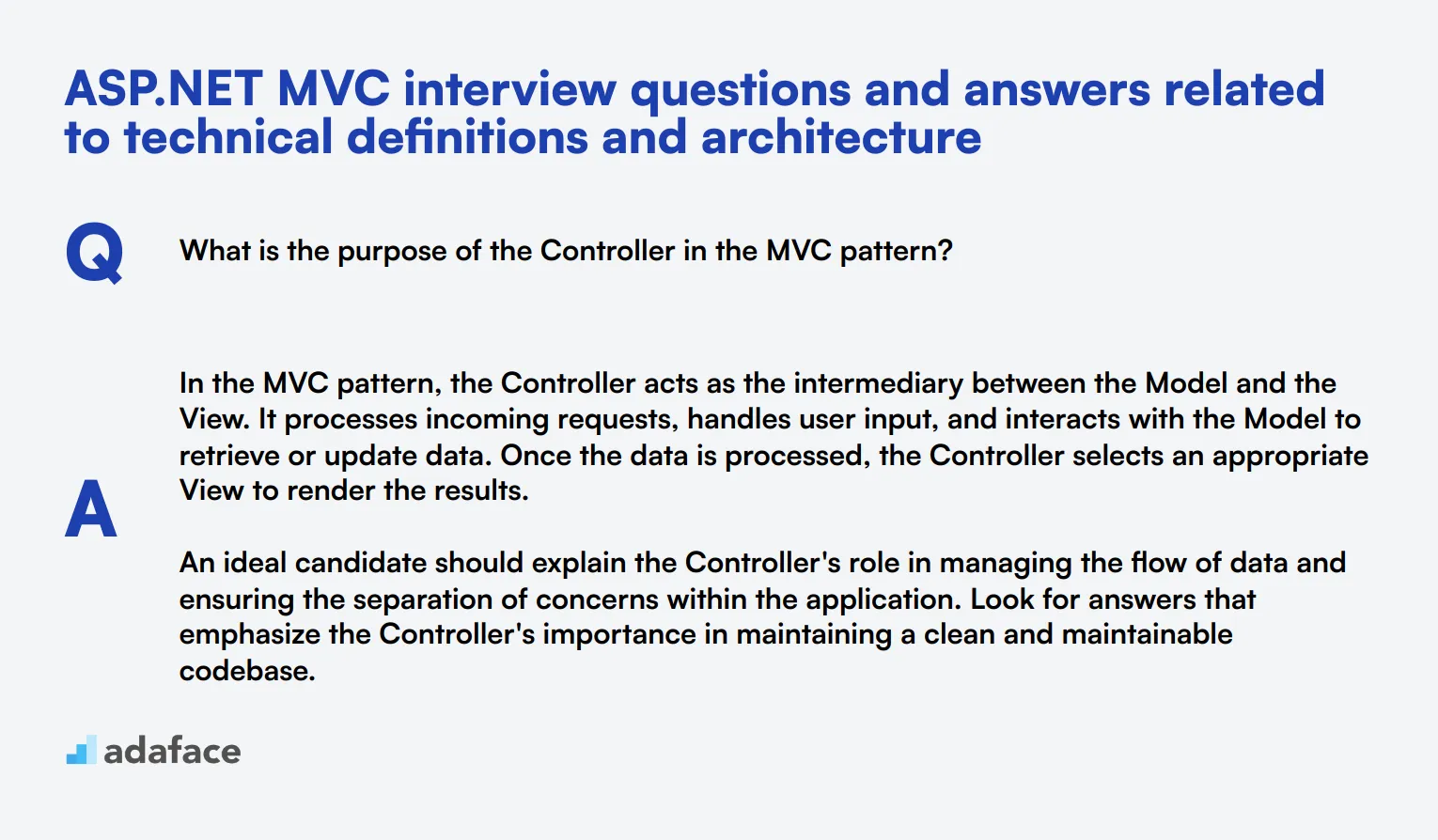
When you're looking to evaluate a candidate's grasp on the intricacies of ASP.NET MVC, these interview questions can be your secret weapon. Use them to gauge technical understanding and architectural knowledge in a straightforward yet effective manner.
1. What is the purpose of the Controller in the MVC pattern?
In the MVC pattern, the Controller acts as the intermediary between the Model and the View. It processes incoming requests, handles user input, and interacts with the Model to retrieve or update data. Once the data is processed, the Controller selects an appropriate View to render the results.
An ideal candidate should explain the Controller's role in managing the flow of data and ensuring the separation of concerns within the application. Look for answers that emphasize the Controller's importance in maintaining a clean and maintainable codebase.
2. Can you describe what TempData is and when you would use it in an ASP.NET MVC application?
TempData is a dictionary object provided by ASP.NET MVC to store data temporarily. It is useful for passing data between actions during a single request-response cycle. Unlike ViewBag or ViewData, TempData keeps data for the duration of an HTTP request, even if there are redirects involved.
Candidates should mention scenarios like passing error messages or status updates between actions when a redirect occurs. An ideal answer should demonstrate an understanding of when TempData is more appropriate to use compared to other state management options.
3. What are HTML helpers in ASP.NET MVC and how do you use them?
HTML helpers in ASP.NET MVC are methods that generate HTML markup. They are designed to make it easier to create and render HTML elements in views. Common HTML helpers include methods for creating form controls like text boxes, dropdown lists, and buttons.
Candidates should also mention that using HTML helpers can help reduce the risk of errors and improve the readability of the code. An ideal answer would discuss how HTML helpers improve productivity and maintainability in ASP.NET MVC applications.
4. How do you implement caching in an ASP.NET MVC application?
Caching in an ASP.NET MVC application can be implemented using various techniques like Output Caching, Data Caching, and Distributed Caching. Output Caching stores the dynamic pages generated by the server, while Data Caching stores data objects. Distributed Caching uses external services like Redis or Memcached to cache data across multiple servers.
Look for candidates who can explain the benefits of caching, such as improved performance and reduced server load. An ideal candidate will also discuss scenarios where each type of caching is appropriate.
5. How do you manage sessions in an ASP.NET MVC application?
Sessions in ASP.NET MVC are managed using the Session object, which stores user data for the duration of the user's session on the web application. Session data can be stored in various ways, such as in-process, state server, or SQL Server, depending on the application's requirements.
Candidates should explain the importance of choosing the right session management strategy based on factors like scalability and performance. Look for answers that include considerations for session security and lifecycle management.
6. What are some common performance issues in ASP.NET MVC applications, and how can they be addressed?
Common performance issues in ASP.NET MVC applications include slow database queries, inefficient code, memory leaks, and improper use of caching. These issues can be addressed by optimizing SQL queries, refactoring code, using profiling tools to identify bottlenecks, and implementing proper caching strategies.
An ideal candidate will mention specific tools and techniques they have used to identify and solve performance issues. Look for answers that demonstrate a proactive approach to performance optimization.
7. How do you handle cross-site request forgery (CSRF) protection in ASP.NET MVC?
ASP.NET MVC provides built-in support for CSRF protection through the use of anti-forgery tokens. These tokens are generated by the server and included in the form data. When the form is submitted, the server validates the token to ensure the request is legitimate.
Candidates should explain how to implement and validate anti-forgery tokens in forms. Look for answers that demonstrate a clear understanding of the importance of CSRF protection and how it helps prevent malicious attacks.
12 ASP.NET MVC questions related to lifecycle and routing
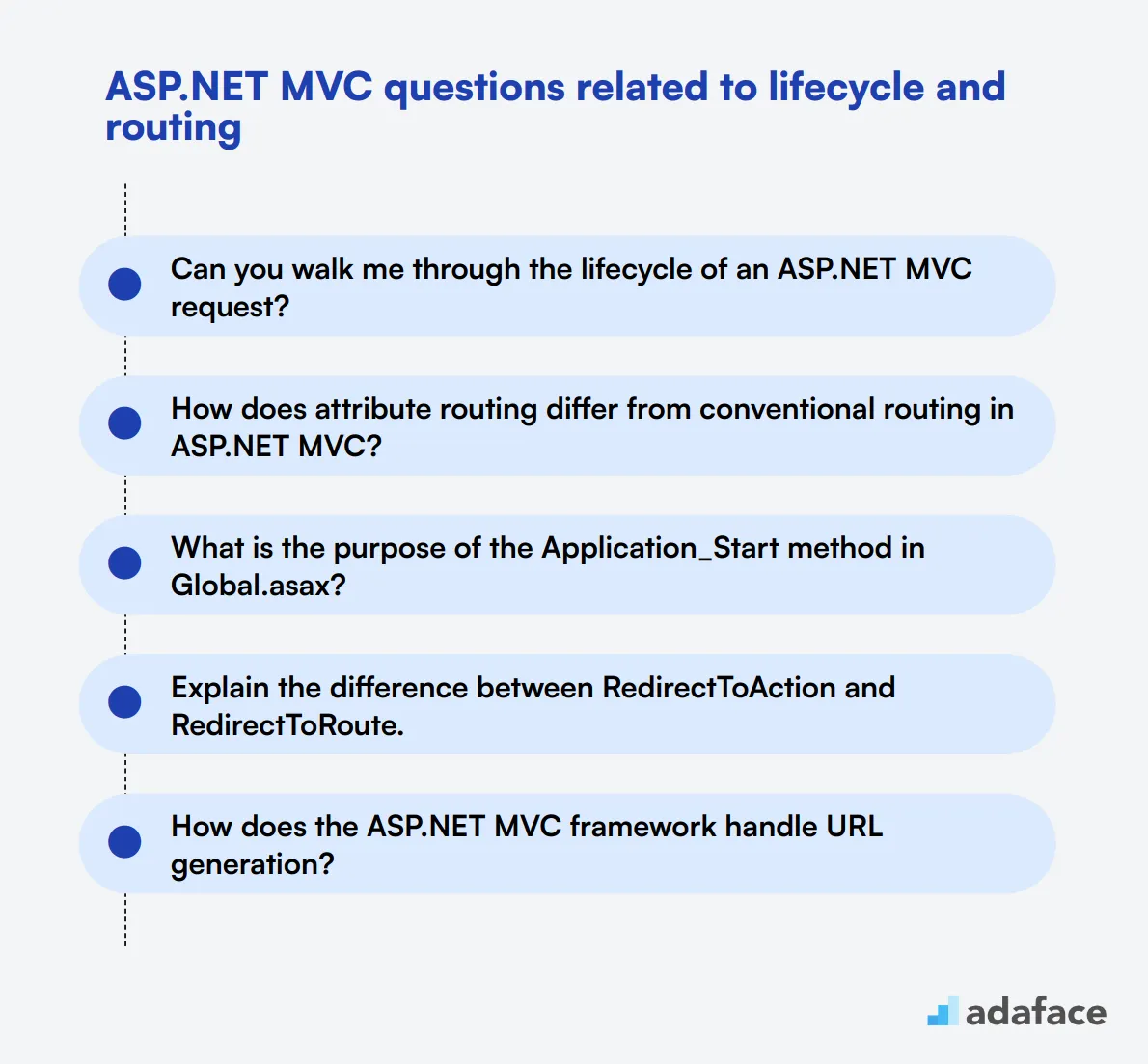
To assess a candidate's understanding of ASP.NET MVC's lifecycle and routing mechanisms, consider asking some of these 12 interview questions. These questions will help you evaluate the applicant's proficiency in handling request processing, application flow, and URL management within ASP.NET MVC applications.
- Can you walk me through the lifecycle of an ASP.NET MVC request?
- How does attribute routing differ from conventional routing in ASP.NET MVC?
- What is the purpose of the Application_Start method in Global.asax?
- Explain the difference between RedirectToAction and RedirectToRoute.
- How does the ASP.NET MVC framework handle URL generation?
- What is the role of the RouteConfig class in ASP.NET MVC?
- Can you explain the concept of route constraints and provide an example?
- How does ASP.NET MVC handle incoming requests and map them to controller actions?
- What is the purpose of the [HttpGet] and [HttpPost] attributes in controller actions?
- How can you create custom route handlers in ASP.NET MVC?
- Explain the differences between Server.Transfer and Response.Redirect.
- How does ASP.NET MVC handle 404 errors, and how can you customize this behavior?
9 situational ASP.NET MVC interview questions for hiring top developers
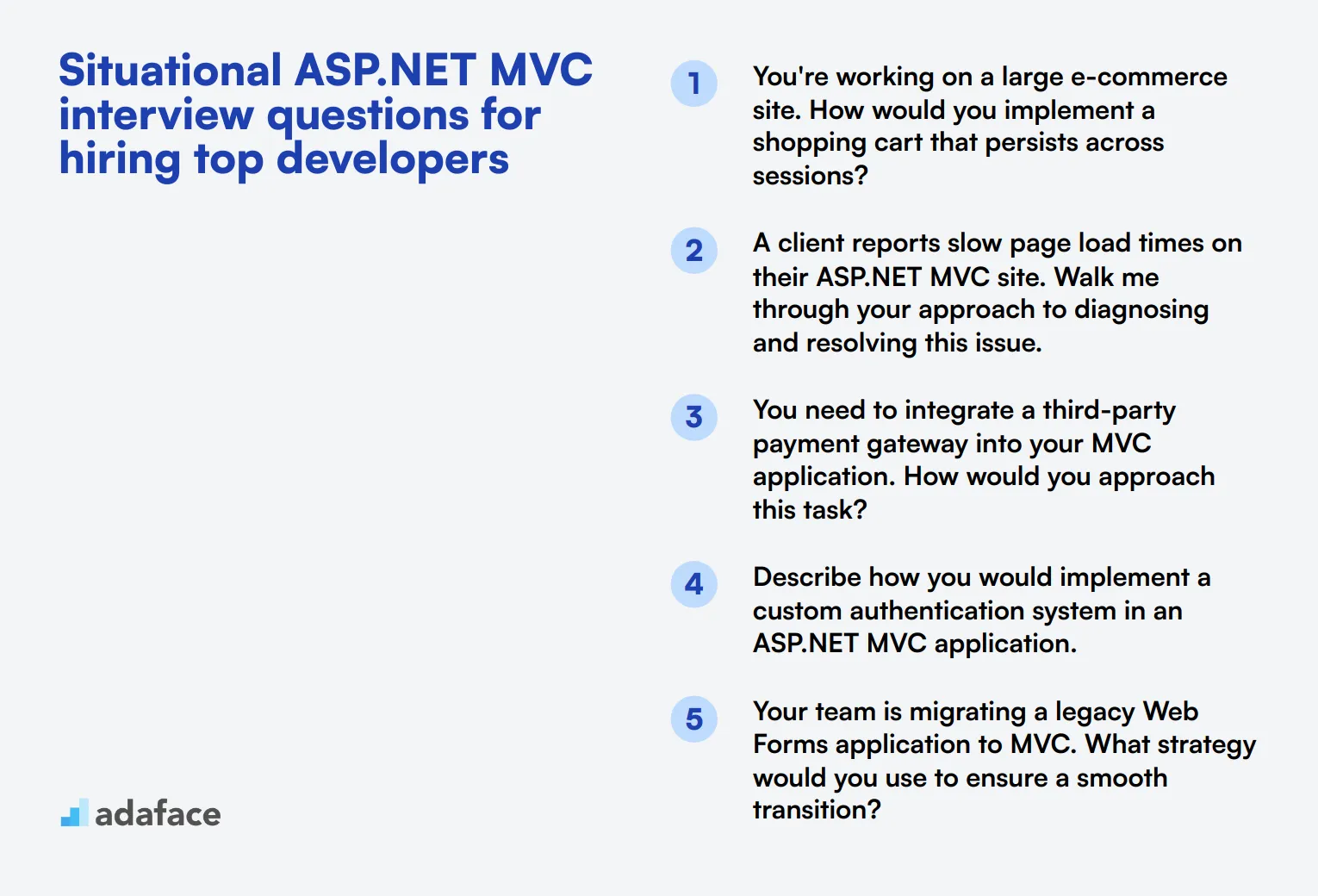
To assess a candidate's practical knowledge and problem-solving abilities in ASP.NET MVC, consider using these situational questions. They're designed to reveal how ASP.NET developers approach real-world scenarios, helping you identify top talent for your team.
- You're working on a large e-commerce site. How would you implement a shopping cart that persists across sessions?
- A client reports slow page load times on their ASP.NET MVC site. Walk me through your approach to diagnosing and resolving this issue.
- You need to integrate a third-party payment gateway into your MVC application. How would you approach this task?
- Describe how you would implement a custom authentication system in an ASP.NET MVC application.
- Your team is migrating a legacy Web Forms application to MVC. What strategy would you use to ensure a smooth transition?
- How would you implement real-time notifications in an ASP.NET MVC application?
- You're tasked with creating a multi-tenant ASP.NET MVC application. How would you design the architecture?
- Explain how you would implement a role-based access control system in an ASP.NET MVC application.
- A client wants to add a blog to their existing MVC site. How would you integrate this new feature?
Which ASP.NET MVC skills should you evaluate during the interview phase?
Evaluating the right skills during an ASP.NET MVC interview is essential to determine if a candidate is fit for the role. While it is impossible to assess everything about a candidate in one interview, focusing on core ASP.NET MVC skills can provide a solid foundation for making an informed hiring decision.
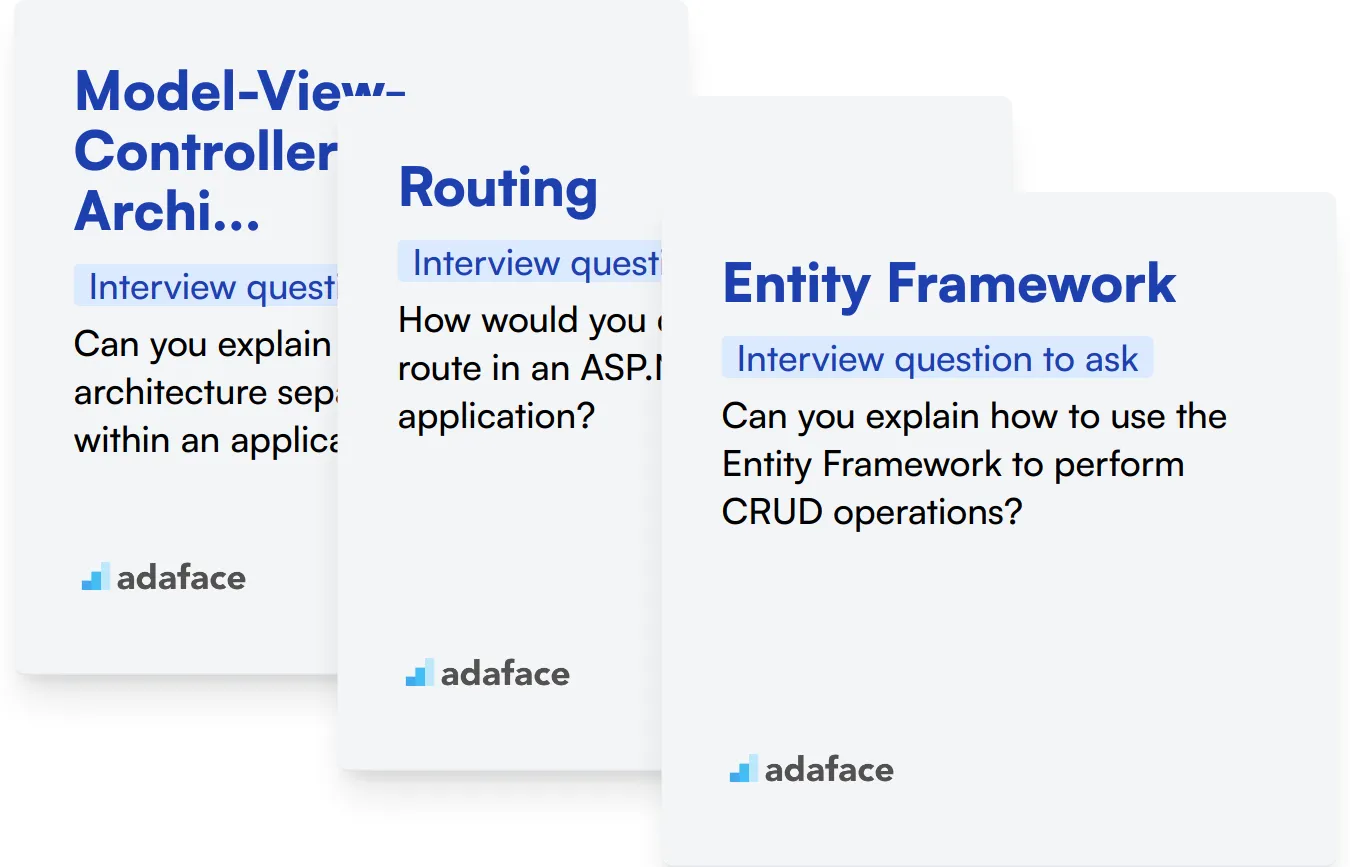
Model-View-Controller (MVC) Architecture
One way to assess a candidate's understanding of the MVC architecture is through an assessment test that includes MCQs on this topic. Consider using our ASP.NET MVC online test.
Additionally, you can ask targeted interview questions to gauge their understanding of MVC architecture.
Can you explain how the MVC architecture separates concerns within an application?
Look for a clear explanation of how the Model, View, and Controller work together to handle different aspects of an application. A good candidate should mention how this separation improves code manageability.
Routing
To evaluate a candidate's knowledge of routing, you can use an assessment test that features relevant MCQs. Try our ASP.NET MVC online test.
You can also ask targeted questions in an interview to judge their understanding of routing.
How would you define a custom route in an ASP.NET MVC application?
Look for an answer that includes the steps for defining a custom route in the RouteConfig file. The candidate should illustrate knowledge of route parameters and constraints.
Entity Framework
Assessing a candidate's familiarity with Entity Framework can be done through an assessment test. Consider using our Entity Framework online test.
In the interview, you can ask specific questions to evaluate their proficiency with Entity Framework.
Can you explain how to use the Entity Framework to perform CRUD operations?
Expect a detailed explanation covering basic CRUD operations—Create, Read, Update, Delete—using Entity Framework. The candidate should demonstrate an understanding of DbContext and DbSet.
3 Strategic Tips for Leveraging ASP.NET MVC Interview Questions
Before you start utilizing the insights from our ASP.NET MVC interview questions, here are some strategic tips to enhance your interview process and ensure you’re fully prepared.
1. Incorporate Skill Tests to Pre-Screen Candidates
Initiating the interview process with skill tests can drastically improve the quality of your candidate pool by verifying necessary technical skills before in-depth interviews. This preemptive step ensures that only qualified candidates advance, saving time and resources.
For ASP.NET MVC roles, consider using programming tests from our test library that focus on relevant languages and frameworks, helping you assess essential skills efficiently.
By filtering candidates early through skill assessments, you not only streamline your interview process but also enhance its effectiveness. This approach allows you to focus subsequent interviews on deeper exploration of candidates' technical and problem-solving abilities.
2. Curate Your Interview Questions Wisely
With limited time available during interviews, selecting the right questions is key to evaluating the most critical aspects of a candidate’s capabilities. It’s about quality, not quantity.
Explore our library for related interview questions on skills like .NET Core, C#, and other relevant technologies. This will help you craft a session that not only assesses ASP.NET MVC skills but also complementary skills that are essential for the role.
Integrating questions on soft skills such as problem-solving and communication can provide holistic insights into candidates, ensuring they fit all aspects of the job requirements.
3. Always Follow Up with Probing Questions
Relying solely on standard interview questions may not reveal the full extent of a candidate’s expertise or potential. Follow-up questions are necessary to dig deeper into a candidate's responses and challenge them to demonstrate real understanding and problem-solving skills.
For instance, if a candidate discusses an ASP.NET MVC project they've worked on, follow up by asking about specific challenges they faced and how they overcame them. This can reveal critical thinking abilities and suitability for the role.
Use ASP.NET MVC interview questions and skills tests to hire talented developers
If you are looking to hire someone with ASP.NET MVC skills, it’s important to ensure they possess those skills accurately. The most effective way to do this is by utilizing skill tests, like our ASP.NET MVC coding tests.
After administering the test, you can easily shortlist the best applicants and invite them for interviews. To get started, you can sign up at Adaface and explore more about our programming tests to find the right fit for your team.
Asp.Net MVC Online Test
Download ASP.NET MVC interview questions template in multiple formats
ASP.NET MVC Interview Questions FAQs
The questions cover junior, mid-tier, and senior developer levels, making them suitable for assessing candidates across various experience ranges.
Combine these questions with practical coding tests, tailor them to your specific project needs, and use them to gauge both technical knowledge and problem-solving skills.
Yes, the questions cover various aspects including architecture, lifecycle, routing, and practical application of ASP.NET MVC concepts.
It's advisable to review and update your question set regularly, especially after major ASP.NET MVC framework updates or changes in industry best practices.

40 min skill tests.
No trick questions.
Accurate shortlisting.
We make it easy for you to find the best candidates in your pipeline with a 40 min skills test.
Try for freeRelated posts
Free resources




